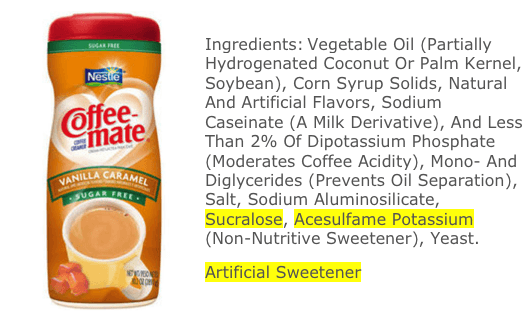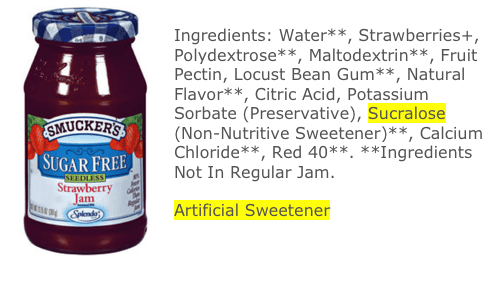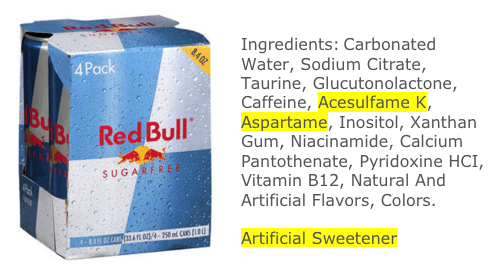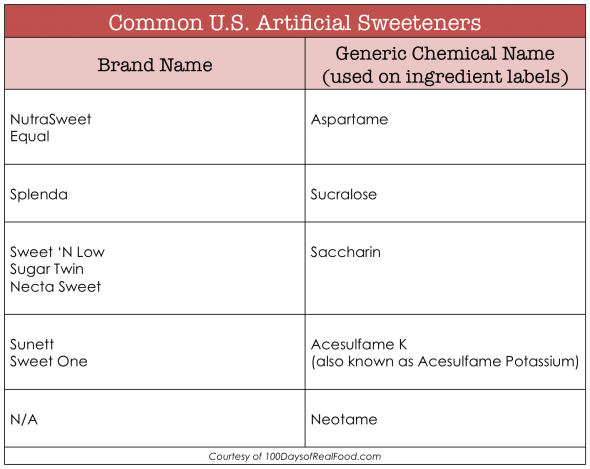When a packaged food is touted as "Sugar Free," that oftentimes means the real sugar has been left behind and replaced with an artificial sweetener. This is yet another reason why it is so important to always read ingredient labels.
Did you know that artificial sweeteners were literally invented in a lab by food scientists and that some of those sweeteners only entered our food system as recently as a few decades ago? That is practically brand new in a world where people have been eating for tens of thousands of years and - in my book - the opposite of the real, traditional foods I strive to feed my family.
The Sugar Association says these artificial replacements are "chemically manufactured molecules – molecules that do not exist in nature." And as a result, even though we do our best to avoid white (refined) sugar, I'd personally rather eat that (i.e., the real thing) over artificial sweeteners any day. To see which added sweeteners we've decided are real food approved, be sure to check out our "No Refined Sweeteners" mini-pledge.
Some "Sugar Free" Examples
(Clearly I see loads of other problems with these ingredient labels, but I am just sticking to the topic at hand today.)

Want to Save this Recipe?
Enter your email below & we'll send it straight to your inbox. Plus you'll get great new recipes from us every week!


Recent Headlines
The facts that raise red flags against artificial sweeteners are just startling.
From a Purdue University Study:
"Accumulating evidence suggests that frequent consumers of these [artificial] sugar substitutes may also be at increased risk of excessive weight gain, metabolic syndrome, type 2 diabetes, and cardiovascular disease."
From TakePart.com:
“We have the abstract of the study and what the laboratory said about leukemia. We don’t have the full data yet. That’s why we put ‘caution’ instead of ‘avoid.’ When there is evidence that something causes cancer, we take that pretty seriously. [Sucralose] caused cancer in the animals. We thought that we should pass that information on, and couldn’t, in good conscious, say it was safe,” says Lisa Lefferts, a senior scientist with CSPI (Center for Science in the Public Interest).
From CSPI (Center for Science in the Public Interest):
"In 2012 an independent Italian laboratory announced (but has not yet published) a study that found that sucralose caused leukemia in mice that were exposed from before birth. That was the same lab that several years earlier published studies indicating that aspartame caused cancers in rats and mice."
From USA Today:
"Despite claims from Coke and other companies about the safety of aspartame, we still don't know about its long-term effects," says Karen Congro, a nutritionist and director of the Wellness for Life Club program at the Brooklyn Hospital Center. "Relying on artificial sweeteners probably causes cravings for sweets and sugar, which can contribute to obesity and poor eating habits."
From Huffington Post:
According to Kristin Kirkpatrick, M.S., R.D., L.D., "A study in the journal Diabetes Care found that daily consumption of diet soda was associated with a 36 percent greater relative risk of developing metabolic syndrome and a 67 percent greater relative risk of developing Type 2 diabetes compared with non-consumption. Another study in the American Journal of Clinical Nutrition found that, in one group of study participants, consumption of artificially sweetened beverages was associated with Type 2 diabetes. The findings are mimicked in rat studies as well. A study in the journal Behavioral Neuroscience found that consumption of products containing artificial sweeteners led to weight gain due to changes in the rat's normal physiological processes of sweets. In addition to this, the presence of constant artificial sweeteners in the diet means you're never really letting your taste buds get a break from the sweet taste you love. The more you drink diet soda, the longer you'll remain trapped in the sugar cycle and continue to crave."
Artificial Sweetener Cheat Sheet
Artificial sweeteners come under a variety of different types and brand names, which makes them one of the many confusing aspects of packaged foods.

Note: Stevia is sometimes classified as an artificial sweetener, but it's actually derived from the stevia plant. However, it is often sold in a highly processed (powdery white) form, so it is not something we personally use or recommend.
Tell the FDA
Did you know that you can report adverse reactions or other problems associated with FDA-regulated food products? I am not sure how much it really helps, but it certainly can't hurt. Find the correct number for your state on the FDA website. Be sure to let them know if you or someone you know has had trouble with artificial sweeteners and/or artificial food dyes.
We'd love to hear your thoughts about artificial additives in the comments below.





Barbara says
Artificial sweeteners 'BAD.' Sugar 'good.' "NUTS" I noticed absolutely nothing on 'raw sugar,' which is NOT refined or processed with 'ahem' Chemicals..Somehow, that does not surprise me. All this put down on artificial sweeteners, once again putting down some excellent products that aren't on your hit list. Agree with the FDA..Have you lost your minds. The FDA, and every man and woman who works for them, have sold their minds, bodies and souls to the American Pharmaceutical corporations, the most greediest, corrupt, PIGS who would sell prescription drugs that are often not tested..Only most testing is done when 'too' many lives have been lost, and not before. Amazing how they test their drugs, ALWAYS too late to save those lives..Trust the most wealthiest, as in the TRILLIONS in profits EVERY year..NO THANK YOU..Those same drugs they sell in the states can also be purchased in Canada at 40% cheaper..In Mexico, 80% cheaper..But the lousy Americans that they are, steal it from American citizens because we either have insurance or can afford it..American Pharmaceutical corporations are manned by INhuman parasites, and we ALL know what parasites are - don't we now...
Allison says
I have to say I love your enthusiasm!
Tonya says
This is the stevia I have been using for many years. It is 100% organic and does not have any extra ingredients, just stevia.
http://herbaladvantage.com/showproducts.cfm?UUID=1A6D4525-3048-83DA-7AC695044461E0F2.02252016&AID=1&CategoryID=1&Ltr=A-Z
Jennifer White says
If you think about what occurs in nature, without our interference, you have things like fruit, sugar cane (or stevia leaves) and honey. Fruit has fiber and other nutrients, which makes us full or will increase the speed of digestion. You can drink way more apple juice than you could eat apples. Honey would be a rare treat in nature, and contains natural antibiotics and other minerals. Sugar cane and stevia not being concentrated also would provide marginal sugar concentrations with other beneficial nutrients. We are finally starting to see the correlation with obesity, diabeties and increasing sugar content in all foods. We are also seeing how sugar feeds cancer. Almost like any drug, sugar and sugar substitutes spike our levels and create a "high". And it really is addictive. Unfortunately the sugar substitutes are even worse than the sugar itself, yet these are what diabetic patients were advised to eat rather than real sugar - not knowing how much it was affecting their insulin levels. I, just as most americans, have a suar additiction, and there is no easy out. It is both expensive and difficult to eat whole nutrious foods, with the plethora of processed and sugar injected foods available in the supermarket. You have to ween you additiction, and unfortunately every holiday is associated with a sweet treat. Easter, Christmas, Halloween, Valentines Day..... Food companies want us to remain addicted, becuase sugar and artificial sweeteners dont satiate us, and so we want more and more...which means more profit. Solution is only to avoid any sugar and other than what occurs naturally, with honey and carb foods (which is process by your body similarly to sugar) in strict moderation as well. Just like any addiction, you are going to have in rough at first, but as long as you foods are balanced and wholesome your cravings for sugar will eventually be minimal. I wont say disappear because you will always have to fight the temptation that is everywhere around you.
Jennifer White says
I also wanted to mention that my aunt was diagnosed with cancer. It was caught early, but they still suggested chemo or radiation. She refused, and instead went on a very strict holistic diet, which cut out any form of sugar. Needless to say, her cancer is in remission. There is way more to our diets than the medical industry is giving credit, and know for a fact from talking to doctors and students how little emphasis diet & nutrition is placed in medical education and practice. Hopefully that is changing, but when it comes to treatments of disease - there is little profit to make from someone helping to treat themselves by managing their own health, rather than relying on pills or invasive medical treatments. Is our medical system really set up to help us, or to keep us dependent on "easy" solutions like drugs to cover our symptoms or create new complications that require more drugs and treatments? We our taught that the easy way is the best way, so thats what we demand, and eventually we pay in the end.
Debbie says
What about liquid Stevia vs. the packets? I have used that for a while now but see where it is not good either!!
Kathryn says
I have been told that agave can be used as a natural substitute for other sweeteners. What are the benefits or risks of using this as a diabetic who is trying to lose quite a bit of weight (excess of 100 pounds)?
Amy Taylor (comment moderator) says
Hi there. I would take that question to your doctor, for sure.
Amy S says
Where does xylitol rank in the sweetners? Thanks
Amy Taylor (comment moderator) says
Hi. We really do not use any artificial sweeteners but understand it is necessary for some. In a pinch, I would choose stevia.
Amy S says
Thanks for your answer. Our family doesnt use any either but I wanted to get some info on xylitol just because. :) Thanks again.
Amy Taylor (comment moderator) says
It is a sugar alcohol. My personal experience with it in chewing gum is a bloated belly. :)
Leechy says
Xylitol can cause stomach upset, as most sugar alcohols. Erythritol is a fermented 0 calorie sweeter similar to xylitol but easier on the stomach. It's also harder to find and a lot more expensive
Myra says
What can a type 1 insulin dependent use instead of splenda
Shi says
I am not 100% sure but try asking your doctore about stevia. When I was a trainer we were told to recommend it as a safe option to ask doctors about. ALWAYS ask your doctor.
Katie says
I have been searching the internet with the same question! I love the idea of clean eating, but as a type 1- I can't implement maple syrup as an alternative & I see that in a lot of the recipes I want to make on here.
Elizabeth says
Hi! I was wondering how you felt about carbonated water? I like Perrier and only drink the regular kind because of the "natural flavors" in the lime and grapefruit flavored ones. So is carbonated water ok? And are natural flavors ok? I have stayed away from natural flavors because I didn't think they were the best thing for me!
Amy Taylor (comment moderator) says
Hi there. Carbonated water is fine. If you need a little flavor add a squeeze of your own lemon, limes, oranges, etc. :)
sybil kizer says
The term "natural flavors" on any label doesn't mean a thing - just advertising buzz words to make consumers believe they are getting something they aren't.
Mrs_MG says
Today, I looked for fruit juice concentrates. Unfortunately, there are very few that don't have added sugar or sweeteners. The ones that almost got me were "no added sugar" fruit juice concentrates (Robinsons). But knowing a bit about Robinsons products, I suspected that claim. After a bit of web searching, I found the ingredients list, and sure enough, there is "no added sugar". That is, no natural sugars have been added. But plenty of unnatural sweeteners have been added.
Here are the ingredients for "Robinsons Double Concentrated Summer Fruits No Added Sugar" per Waitrose:
Water, Fruit Juices from Concentrate 20% (Apple 18%, Strawberry 0.8%, Plum, Blackcurrant, Cherry 0.3%), Acid (Citric Acid), Natural Colours (Anthocyanins), Acidity Regulator (Sodium Citrate), Sweeteners (Sucralose, Acesulfame K), Natural Flavourings, Preservatives (Potassium Sorbate, Sodium Metabisulphite), Stabiliser (Cellulose Gum)
Sucralose, Acesulfame K -- maybe not "sugar" but definitely added sweeteners!
And for "Robinsons Double Concentrate Orange & Pineapple No Added Sugar" ingredients:
Water, Orange Fruit from Concentrate (16%), Pineapple Juice from Concentrate (4%), Acid (Citric Acid), Acidity Regulator (Sodium Citrate), Natural Flavouring, Sweeteners (Aspartame, Saccharin), Preservatives (Potassium Sorbate, Sodium Metabisulphite), Stabiliser (Cellulose Gum), Natural Colour (Carotenes).
Now it's Aspartame and Saccharin -- eeek!!
So, obviously, the "No added sugar" on the front doesn't even come close to "unsweetened" pure juice concentrate. They are out there, but difficult to find. Suma, for example, sells an organic apple juice concentrate with just -- wait for it -- concentrated apple juice! Now, if I could only find an orange juice concentrate with only concentrated orange juice. (*sigh*) Wish me luck!
Mary says
Is there any form of Stevia that is safe and how do we know? I started drink a sparkling water flavored with Stevia and has good flavor. I thought this was good. I am having a hard time breaking the soda addiction without having something with real flavor in it and not a ton of calories. It is so defeating. I drink SOBE Lifewater which has "Purified Stevia Leaf Extract" in it. What should it say if it is the good kind of Stevia if there is such a thing? It says on the bottle that there are no artificial sweeteners in it. Some teas are bland or have too many calories. It is discouraging.
Brandy says
Try la croix water, it's flavored, no sweetener, and its carbonated
Amy Taylor (comment moderator) says
Hello there. My family broke the soda habit by drinking sparkling water with just a splash of 100% organic juices. We were off the stuff in no time. Here is a post on stevia that you might find helpful: https://www.100daysofrealfood.com/2013/04/25/stevia-food-babe-investigates/.
Rachel says
I order an organic 100% pure stevia from Amazon, it is not cut with acura lose as is ALL stevia I found for sale in stores. The stuff is so powerful that a pinch even smaller than a pencil eraser is enough to sweeten 8-10oz drinks.
http://www.amazon.com/gp/aw/d/B0047USSFS
Rachel says
Sucralose not acura lose
Nichole says
Has anyone used Lucuma powder?
Dawn clem says
I haven't yet found an artificial sweetener that does not cause me headaches.
Carol says
I am borderline diabetic and am fighting to reverse my numbers. I cannot use sugar and eschewed it from my diet. Monk fruit is my choice and at this point I have to stick with that.
Rachel says
I made chocolate chip cookies with monk fruit sweetner and they were delicious. I left out the chocolate chips but just made that same batter and added some oatmeal. I loved them
devyn says
How about agave?
Amy Taylor (comment moderator) says
Hi Devyn. Agave is not a sweetener we use. This perspective reflects why: http://www.foodrenegade.com/agave-nectar-good-or-bad/.
danielle says
Hey i suffer severe migraines and find it impossible to find full sugar squash etc in supermarkets (uk based) the reason for wanting full sugar is aspartamine causes severe headache and often makes people very ill if they drink lots of us. People need to stop worrying about lots of sugar and just use moderation instead of sweeteners as they can cause more problems. At least sugar is natural unlike sweeteners that are produced in a factory.
T. Patton says
What about Stevia?
Amy Taylor (comment moderator) says
Hi. Technically stevia falls outside of the rules but you have to decide what works best for you. Here is a post that might help you find a quality stevia: https://www.100daysofrealfood.com/2013/04/25/stevia-food-babe-investigates/.
Joanna says
What are your thoughts on organic coconut palm sugar?
Amy Taylor (comment moderator) says
Hi Joanna. Like other sugars, palm sugar is fine outside of the pledge used in moderation. When I do sweeten something, palm sugar is my sweetener of choice.
Renee Evola says
I'm curious to hear your opinion on stevia. I frequently use flavored stevia in place of sugar or other sweeteners
Amy Taylor (comment moderator) says
Hi there. Here is a Food Babe post on stevia: https://www.100daysofrealfood.com/2013/04/25/stevia-food-babe-investigates/.
UR Kidding says
I have to echo Andrew's statements about the examples not really being legit. Of course, since many of these sweeteners are relatively new, there is limited information about their long-term effects in humans. So if there are long-term effects--and that is your primary concern--then you may have a point. However, none of these data support the often heard claim that artificial sweeteners are "just as bad" as real sugar. When I hear this claim, I ask "what's the evidence for that"? The only answers I get back are usually vague comments about them being "not natural". That is not evidence. Let's take the examples above:
1. From Purdue: This is an opinion piece that posits a hypothesis. It is not a primary research paper. To be sure, there are likely supporting pieces of evidence in the article, but it is not clear-cut.
2. TakePart: Huge RED FLAG here--they don't have the data yet! Let's wait for the data because it is, by definition, the evidence. Lacking it we cannot evaluate anything.
3. CSPI: Same as #2. Rumors are not evidence.
4. USA Today: It's reasonable to think that a new additive could have long-term effects. However, this statement is not evidence of any harm caused by these products.
5. Note the control group is non consumers. If your question is, "Are artificial sweeteners worse than sugar?" You have to compare to folks eating sugar. Maybe a 2 cans of diet Coke per day habit is worse for type 2 diabetes than no Diet Coke, but is it worse than 2 cans of regular Coke per day? I doubt it (but fully admit that I don't know and I am open to bona fide, controlled evidence.)
I think its really important to not over-demonize these substances. It is very likely that they aid folks who need to cut calories and decrease their sugar intake to do so. Obesity is a huge problem in the US and a lot is clearly due to the huge sugar habit we have as a nation!
It's also clear that artificial sweeteners are not a robustly toxic/carcinogenic substance. We'd have those data by now. What I mean is that this is not a smoking cigarettes and lung cancer connection we're talking about. I doubt they'll have a perfect health record (what does?), but until we have real evidence to show that their bad for you, let's be reserved in our judgement.
Importantly, I do agree we shouldn't assume they're harmless either, so let's do the good, well-controlled studies!
Tracy says
I haven't read through all the comments to see if anyone else posted this, so I apologize if it's a duplicate. What is your opinion on artificial sweeteners for those with Type II Diabetes? As a conscientious individual with this condition, I'd rather use these than send my glucose readings sky high (which is what happens with sugar). Artificial sweeteners work for me and many others with diabetes, I'm sure. Sweeteners can help us feel less excluded when it comes to food choices. I think it's more important to be savvy with our nutrition and educate ourselves, rather than to rule out a single ingredient. Those with diabetes have a hard enough time with conflicting (and I believe, incorrect) information from the ADA. We're not going to die because we use Splenda in our coffee versus using sugar.
Assistant to 100 Days (Amy) says
Hi Tracy. Certainly, we understand that there are medical conditions that make it more necessary to consume artificial sugars. My Type II mom in law has had the most luck with stevia. ~Amy
Andrew says
Recent Headlines
"The facts that raise red flags against artificial sweeteners are just startling". Seriously? These "facts" are terrible examples. If we relied on the results of animal studies for all the food we eat, we wouldn't be to consume anything. We know that animal studies cannot be directly compared with human studies. Likewise, just because a study shows a correlation between two variables, such as artificial sweeteners and risk of excessive weight gain, doesn't mean that one causes another. Perhaps those who consume significant amounts of artificial sweeteners also consume a lot of other products that are high in calories thus, leading to their excessive weight gain. Anyone who has completed a science degree in their lifetime, such as nutrition, should at least be able to critically appraise crappy sources of information this, and be a little more critical. If you are going to argue a point, at least use sound research to back it up.
To everyone else on this site, just because you read it on the internet, doesn't make it fact.
Julie says
I am going to look at gum labels as I know they too often times use artificial sweeteners. What information is there on gums/mints that are 'safer' for consumption? Xylitol is found in natural products but is altered in order to extract and use. It also has dental benefits. I have a 5 year old who loves to chew gum. Any thoughts?
Assistant to 100 Days (Amy) says
Hi Julie. This might not be exactly what you were hoping for but it contains a lot of info: http://foodbabe.com/2011/12/09/wanna-a-piece-of-gum/. ~Amy
Kate says
I was wondering what happens if you leave foods with artificial sugar in them in the car during hot weather, such as sugar-free gum?
Assistant to 100 Days (Amy) says
Hi Kate. Oh wow Kate, this is not something I've researched. :/ ~Amy